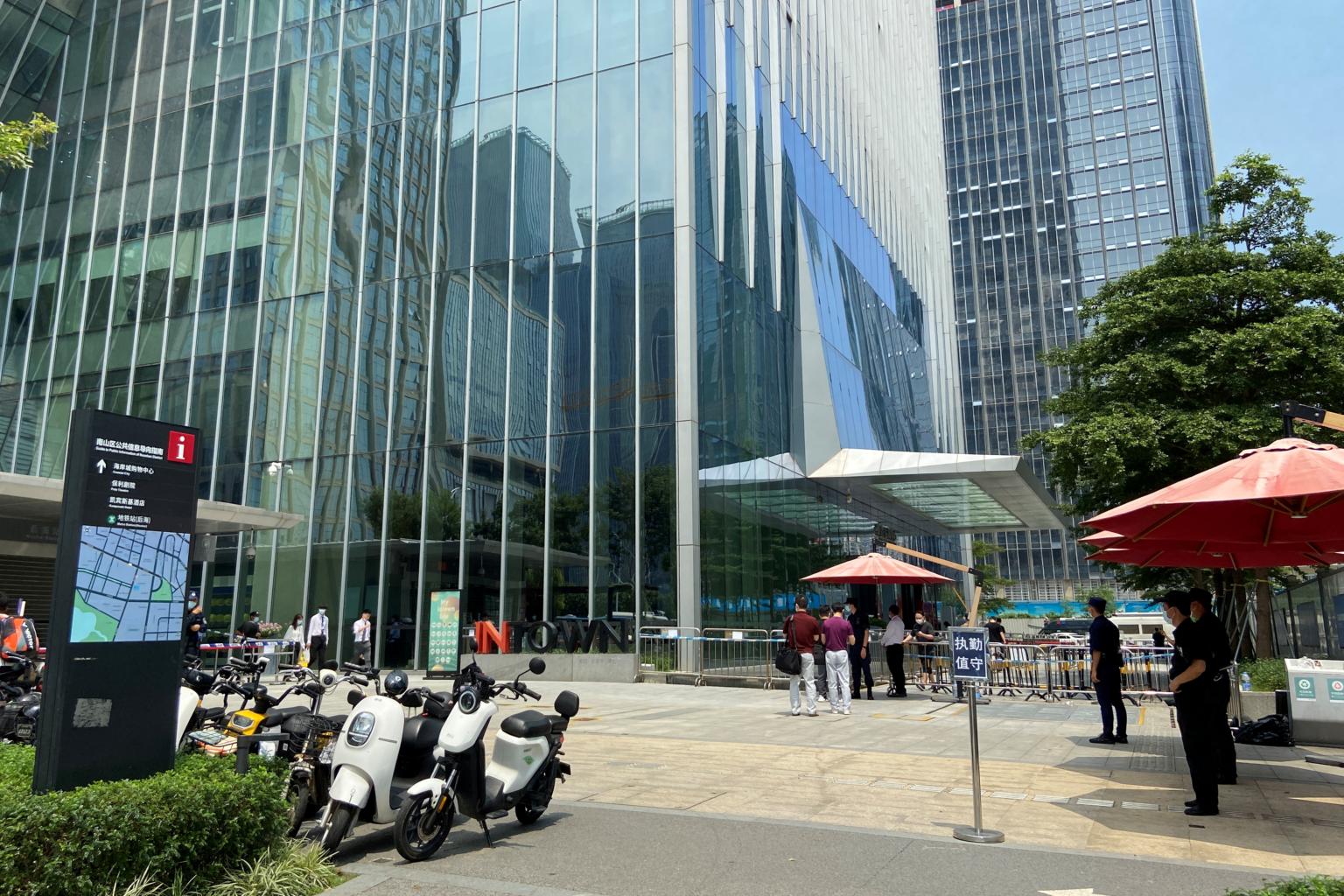China’s Evergrande says deal reached to avoid default on key bond
Sign up now: Get ST's newsletters delivered to your inbox

Security personnel stand guard outside Evergrande’s headquarters, in Shenzhen, China on Sept 17, 2021.
PHOTO: REUTERS
Follow topic:
SHANGHAI (AFP, REUTERS, BLOOMBERG) - Embattled Chinese housing giant Evergrande said Wednesday (Sept 22) it had agreed a deal with domestic bondholders that should allow the conglomerate to avoid default on one of its interest payments.
In a statement to the Shenzhen stock exchange, Evergrande's property unit Hengda said it had negotiated a plan to pay interest worth 232 million yuan (S$48.48 million) for its 5.8 per cent 2025 onshore bond. There was no mention of its repayments on interest for an offshore bond.
Hengda said investors "who bought and held the bonds" before September 22, 2021 "are entitled to interest paid this time".
Evergrande, with over US$300 billion (S$405 billion) in liabilities, is in the throes of a liquidity crisis that has left it racing to raise funds to pay its many lenders and suppliers.
The developer has not indicated whether it will be able to pay US$83.5 million in interest due on its March 2022 bond on Thursday. It has another US$47.5 million payment due on Sept 29 for March 2024 notes.
Both bonds would default if Evergrande fails to settle the interest within 30 days of the scheduled payment dates.
China stocks opened sharply lower on their return from a public holiday on Wednesday, but recouped losses after news of the bond payment deal. The CSI300 index lost 0.7 per cent while the Shanghai Composite Index ticked up 0.4 per cent.
Evergrande's Hong Kong-listed shares had tumbled over 10 per cent during the first two days of the week, when mainland markets were closed for the mid-Autumn Festival. The Hong Kong market was shut on Wednesday for a public holiday.
Singapore shares ended weaker, with the Straits Times Index (STI) slipping 0.49 per cent.
Ms Alicia Garcia Herrero, chief economist at Asia Pacific at Natixis' corporate & investment banking division, noted that Evergrande is a key event for all of the high-yield market in Asia that will affect the Singapore stock and dollar bond market.
"A lot is placed by private banks in the form of high yield structured products for clients. Singapore will clearly feel the pinch," she said.
In another move to calm investors' nerves, China's central bank increased its injection of short-term cash into the financial system.
The People's Bank of China injected 120 billion yuan into the banking system through reverse repurchase agreements, resulting in a net injection of 90 billion yuan. That matches the amount seen on Friday (Sept 17), and was just below that of Saturday.
"The PBOC's net injection is probably aimed at soothing nerves as the market worries about Evergrande," said Mr Eugene Leow, a senior rates strategist at DBS Bank in Singapore. "While the aim may be to instill discipline, there is also a need to prevent contagion into the real economy or to other sectors."
China's cash operations have been aimed at striking a balance between spurring growth hurt by fresh virus outbreaks and tighter regulations, while preventing asset bubbles. Authorities tend to loosen their grip on liquidity toward quarter-end due to increased demand for cash from banks for regulatory checks. Lenders also need to hoard more funds ahead of the one-week holiday at the start of October.
"The PBOC kept its net injection against a possible market plunge," said Zhaopeng Xing, senior China strategist at Australia & New Zealand Banking Group Ltd. "This will soothe the tightness and keep liquidity loose."
China's slowing economy has compounded investor angst. Still, many analysts - including those at Citigroup, Barclays and UBS Group - say the Evergrande crisis isn't likely to become a Chinese version of the Lehman collapse.
Simply boosting liquidity won't be enough to solve the Evergrande crisis by itself, said Mr Ding Shuang, chief economist for Greater China and North Asia at Standard Chartered Plc in Hong Kong.
"What the market hopes the government will do is to come up with a plan that can help the company restructure and refinance in a smooth way," he said. "China's bottom line is that it won't allow the Evergrande issue to turn into a full-fledged financial crisis or let it trigger any systemic risks."
Evergrande is so deeply intertwined with China's broader economy - from retail investors to infrastructure-related firms that are a gauge for global commodities demand - that fears over contagion have kept financial markets on tenterhooks. "There's been a fair bit of concern about the possibility of contagion," analysts at New York-based Bespoke wrote in a research note on Tuesday.
"But so far that concern isn't showing up in parts of the credit markets that have served well as red flags for broader credit crunches in the past."

